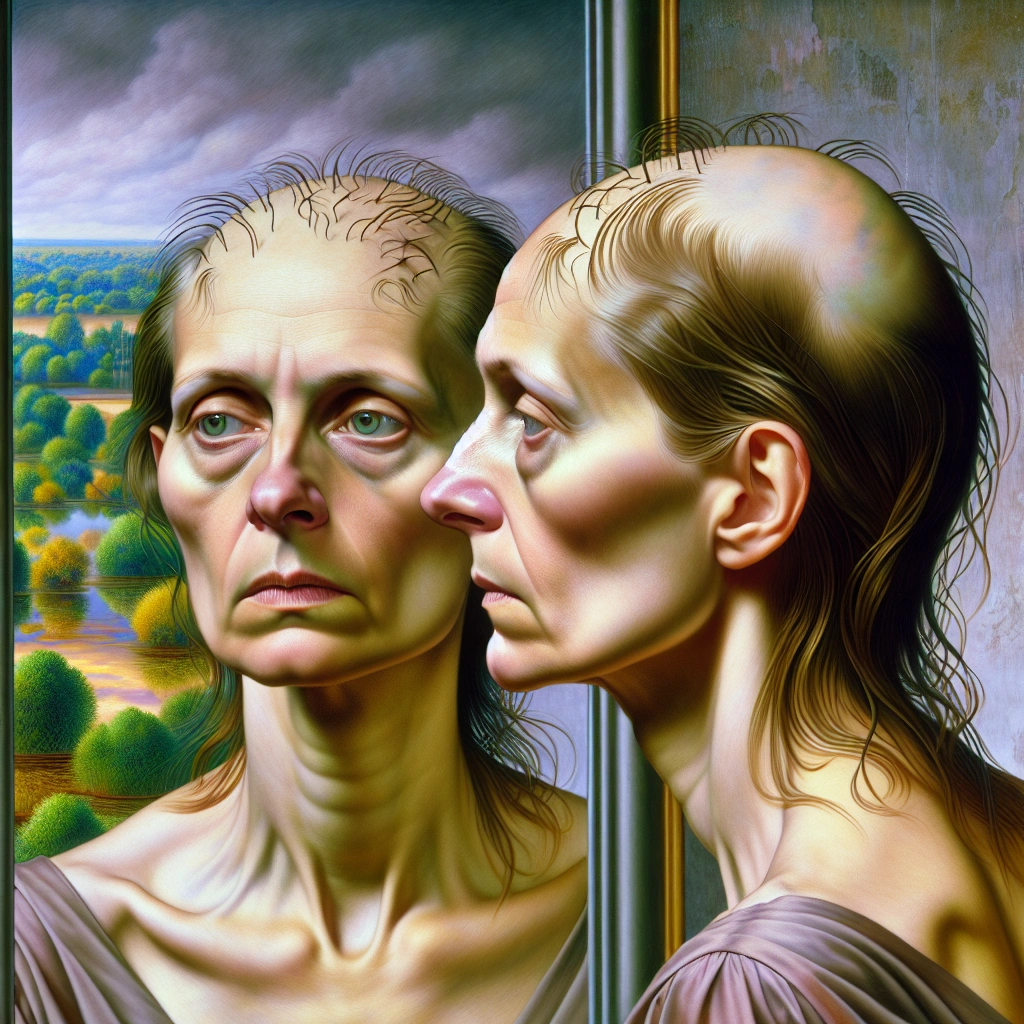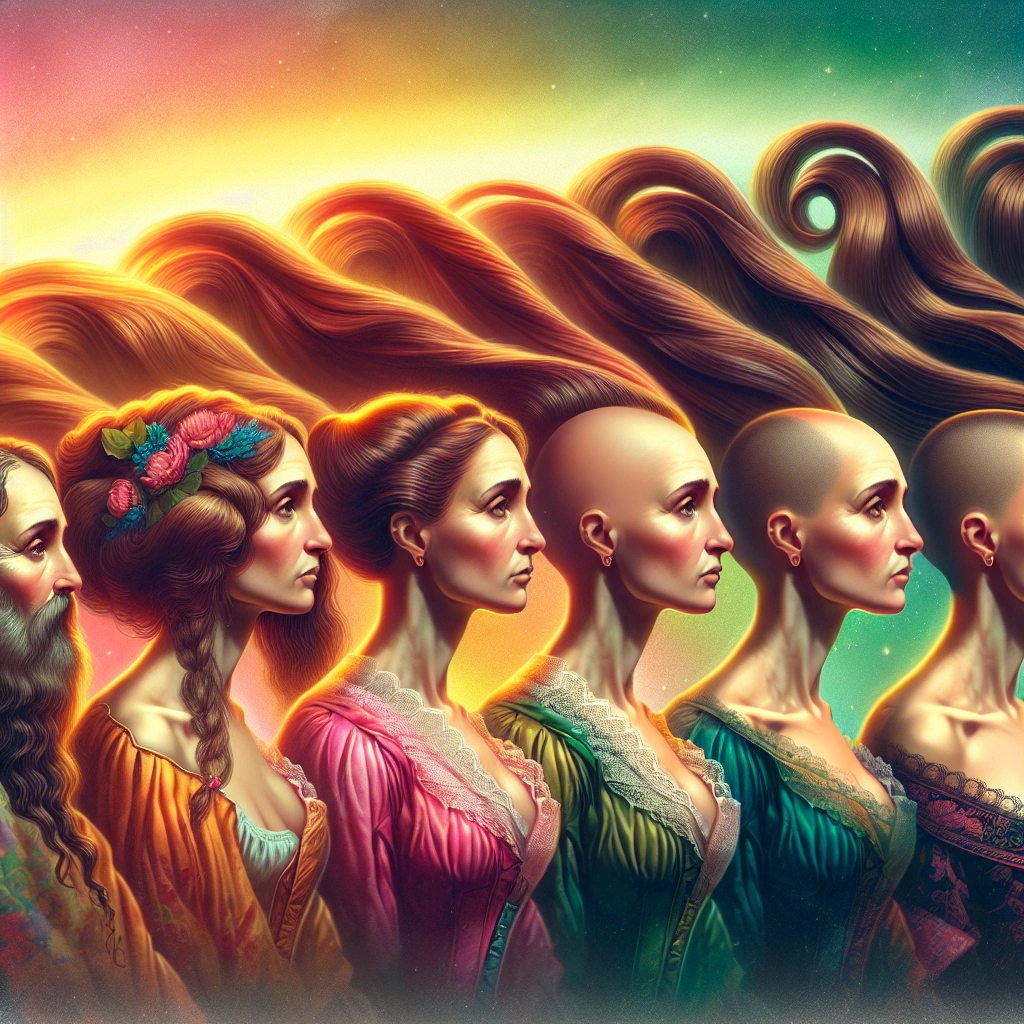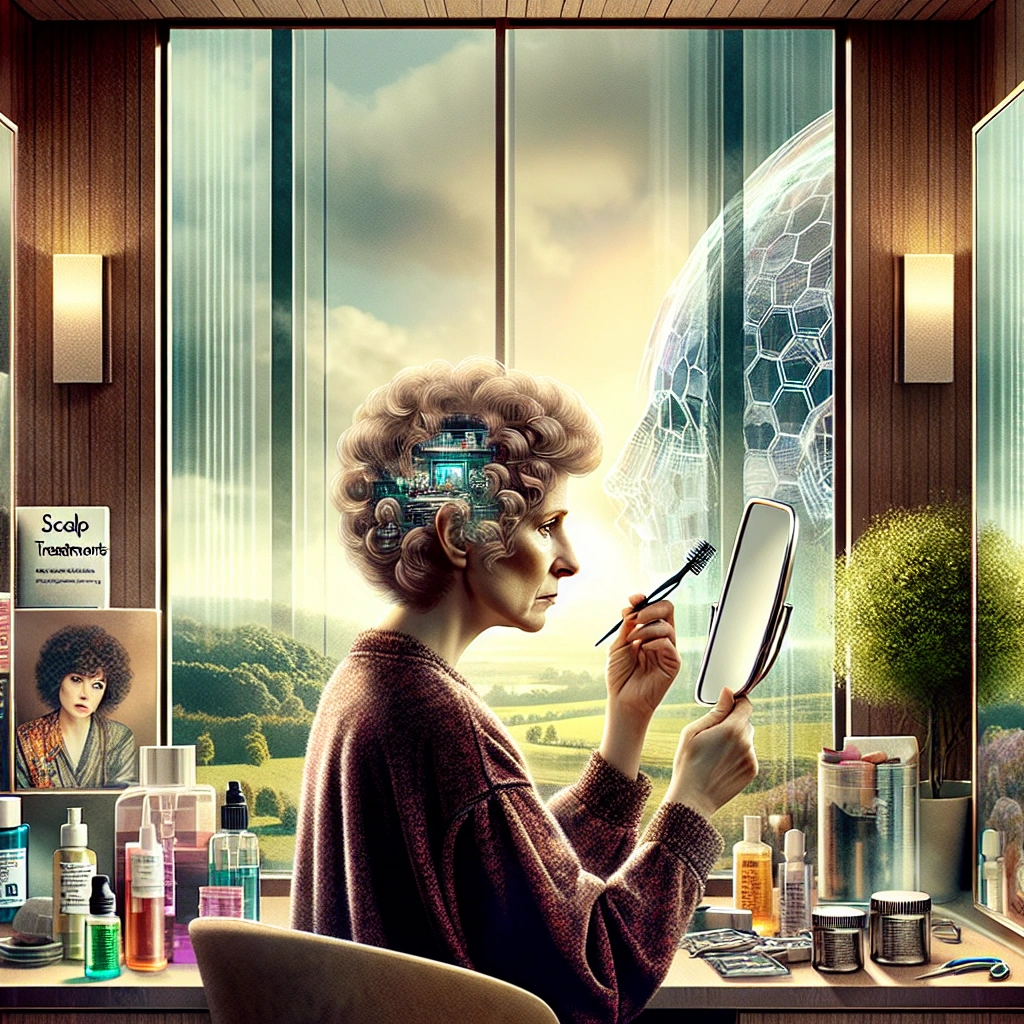

Hair loss in women can have significant psychological effects, leading to anxiety, depression, embarrassment, reduced confidence, and social withdrawal. These effects can have a profound impact on self-esteem and overall mental well-being.
It is crucial to address the psychological consequences of female hair loss to provide support and solutions for those affected.
Discussing the psychological effects of female hair loss is important in order to raise awareness and understanding of the emotional impact it can have. By addressing these effects, individuals experiencing hair loss can feel validated in their emotions and seek the necessary support.
Additionally, understanding the psychological impact can lead to the development of effective interventions and treatments to improve overall mental health and quality of life for those affected by hair loss.
Furthermore, acknowledging the psychological effects of female hair loss can help reduce stigma and promote open conversations about the emotional struggles associated with hair loss. This can lead to greater empathy and support from the community, as well as encourage individuals to seek professional help and resources to cope with the psychological challenges they may face.
Check out this Youtube video: “Let’s Talk Everything Hair… Psychological Effects of Hair Loss” that dives deep into the emotional impact of female hair loss and offers valuable insights for anyone dealing with this issue.
Understanding Female Hair Loss
Definition of female hair loss
Female hair loss refers to the excessive shedding of hair in women, typically more than 125 hairs per day. It can be attributed to a variety of factors, both genetic and environmental, leading to a noticeable reduction in hair volume and density.
Causes of female hair loss
| Factor | Description |
|---|---|
| Hormonal Imbalance | Fluctuations in hormone levels, such as those during menopause, pregnancy, or thyroid disorders, can cause hair loss. |
| Genetic Predisposition | Female pattern baldness, or androgenetic alopecia, often runs in families and is a common cause of hair loss in women. |
| Stress and Trauma | Emotional stress, physical trauma, or extreme shock can trigger temporary or prolonged hair loss in women. |
Psychological Impact of Female Hair Loss
Emotional distress
Hair loss in women often leads to emotional distress, including feelings of self-consciousness, embarrassment, frustration, and jealousy. It can be a significant source of stress and anxiety, impacting daily life and overall well-being.
Self-esteem and body image issues
Female hair loss can greatly affect self-esteem and body image. With even a small amount of hair loss, women may experience a decrease in confidence, self-image, and overall quality of life.
This can lead to social withdrawal, decreased work performance, and even suicidal tendencies.
Mental Health Consequences
Anxiety and depression
- Female hair loss can lead to feelings of anxiety and depression, impacting mental health significantly.
- The fear of losing one’s hair and concerns about appearance can trigger anxiety, leading to constant worry and distress.
- Additionally, experiencing hair loss may result in a sense of helplessness and low mood, contributing to depressive symptoms.
Social withdrawal and isolation
- Female hair loss can cause social withdrawal and isolation as individuals may feel self-conscious about their appearance.
- The impact of hair loss on self-esteem and confidence can lead to withdrawing from social interactions and avoiding public places.
- Moreover, the fear of judgment and negative reactions from others may contribute to a sense of isolation and loneliness.
| Psychological Effects | Description |
|---|---|
| Anxiety and depression | Female hair loss can lead to anxiety and depression, impacting mental health significantly. |
| Social withdrawal and isolation | Female hair loss can cause social withdrawal and isolation as individuals may feel self-conscious about their appearance. |
Coping Mechanisms
Seeking professional help
Seeking professional help from a mental health professional can provide you with the necessary coping skills to manage the psychological effects of female hair loss. These skills can include relaxation techniques, stress management strategies, and cognitive-behavioral therapy to address any negative thought patterns.
Support groups and counseling
Joining support groups and seeking counseling can be incredibly beneficial in coping with the psychological effects of female hair loss. Engaging in a support group allows individuals to share their experiences, emotions, and coping strategies, fostering a sense of community and understanding.
Professional counseling provides a safe space for individuals to process their emotions and develop effective coping mechanisms, promoting mental well-being throughout the journey of dealing with hair loss.
Treatment Options
Medical treatments for hair regeneration
In the quest to address female hair loss, medical treatments offer hope for hair regeneration. Products containing minoxidil have shown efficacy in aiding hair regrowth and slowing down the process of hair loss.
It’s essential to note that these treatments require at least six months of consistent usage to yield noticeable results. Additionally, corticosteroid injections administered by dermatologists can stimulate hair regrowth in thinning or bald areas, presenting an alternative medical intervention worth considering.
Psychological therapy for coping with hair loss
Psychological therapy plays a pivotal role in helping individuals cope with the emotional impact of hair loss. Cognitive-behavioral therapy (CBT) stands out as a particularly effective approach in managing the psychological stress associated with hair loss.
Through self-help strategies and professional guidance, individuals can access valuable tools for dealing with negative emotions and enhancing self-esteem. Engaging with mental health professionals can provide further support and techniques to navigate the psychological effects of female hair loss effectively.
| Psychological Therapy Techniques |
|---|
| 1. Cognitive-behavioral therapy (CBT) |
| 2. Self-help strategies for coping |
| 3. Professional guidance for emotional support |
Remember to always consult with a healthcare professional to determine the most suitable treatment approach tailored to your individual needs and circumstances.
Cultural and Societal Influence
The media plays a significant role in shaping female beauty standards, often portraying unrealistic ideals that can negatively impact women’s self-image. Through airbrushing and digital manipulation, female celebrities are presented as flawless, creating an unattainable standard of beauty for young girls and women.
This constant exposure to perfected images can lead to feelings of inadequacy and low self-esteem, contributing to the psychological effects of female hair loss.
Stigma and stereotypes surrounding female hair loss further exacerbate the psychological impact on affected individuals. Society often associates thick, luscious hair with femininity and beauty, leading to stigma against women experiencing hair loss.
This societal pressure can result in feelings of shame, embarrassment, and a sense of unattractiveness, intensifying the psychological distress caused by hair loss. Cultural and societal influences play a crucial role in shaping perceptions of female beauty and addressing these influences is vital in mitigating the psychological effects of female hair loss.
| Media portrayal of female beauty standards | Stigma and stereotypes associated with female hair loss |
|---|---|
| Unrealistic portrayal of flawless beauty | Society’s association of thick hair with femininity |
Personal Experiences and Stories
Anecdotes from women who have experienced hair loss
- Susan: “I noticed clumps of hair in the shower, it was devastating. The slow retreat of my hairline made me feel less feminine and insecure in social situations.”
- Rachel: “Hair loss made me feel old before my time. It was like losing a part of my identity. I avoided social events and felt constantly self-conscious.”
Testimonials of overcoming psychological challenges
- Maria: “At first, I felt isolated and depressed, but connecting with others who shared similar experiences made a tremendous difference. Now, I feel empowered and confident.”
- Emily: “Seeking professional help and being open about my struggles changed everything. I’m now embracing my baldness and redefining my beauty.”
| Hair Loss Experience | Emotional Impact |
|---|---|
| Thinning hair | Self-conscious |
| Bald patches | Embarrassment |
| Hair retreat | Frustration |
| Receding hairline | Jealousy |
The psychological effects of female hair loss are profound, shaping personal and social lives, sparking feelings of isolation and impacting self-esteem. Overcoming these challenges often involves seeking support, reshaping perspectives, and embracing new definitions of beauty.
Empowerment and Acceptance
Promoting self-acceptance and self-love
It’s crucial to embrace and love oneself, especially in the face of challenges such as female hair loss. Promoting self-acceptance and self-love is essential in empowering women to embrace their unique beauty and worth beyond physical appearance.
Advocacy for diverse representations of beauty
Advocating for diverse representations of beauty is vital in reshaping societal standards and promoting inclusivity. By showcasing diverse portrayals of beauty, we can empower women experiencing hair loss to feel validated, accepted, and beautiful despite societal expectations.
| Types of Representation | Importance |
|---|---|
| Various hair textures and styles | Celebrates diversity and uniqueness |
| Women of different ages and backgrounds | Reflects the true spectrum of beauty |
Coping with Hair Loss at Different Life Stages
Impact of hair loss during adolescence
During adolescence, hormonal imbalances, genetic factors, and inadequate nutrition can contribute to hair loss in both teenage boys and girls. However, teenage girls are often more susceptible to noticeable hair loss due to these factors.
The experience of hair loss during adolescence can lead to self-consciousness, embarrassment, and psychological distress, impacting their self-esteem and social interactions.
Dealing with hair loss in adulthood and later stages of life
In adulthood and later stages of life, the impact of hair loss can be equally significant, causing feelings of frustration, jealousy, and a decline in self-confidence. It may also trigger social phobia, anxiety, and depression, affecting one’s overall well-being and mental health.
Overcoming Stereotypes and Prejudice
When it comes to female hair loss, there are numerous misconceptions that contribute to stereotypes and prejudice. These myths often lead to misunderstandings and insensitivity towards women experiencing hair loss.
By dispelling these myths and providing accurate information, we can challenge the misconceptions about female hair loss.
Challenging misconceptions about female hair loss
| Myth | Truth |
|---|---|
| Hair loss is permanent | Hair loss can be temporary or treatable through various methods such as medication, lifestyle changes, and hair regrowth treatments. |
| Hair thinning only occurs with age | Hair thinning can result from a variety of factors including genetics, hormonal changes, stress, and medical conditions, not just aging. |
| Wearing hats too often causes hair loss | Wearing hats does not directly cause hair loss unless they are overly tight and cause traction alopecia. |
Promoting empathy and understanding in society
It is crucial to promote empathy and understanding in society to support women experiencing hair loss. By raising awareness about the psychological effects of female hair loss and addressing the associated stigma, we can create a more empathetic and supportive environment for women dealing with this issue.
Empathy and understanding can help women feel more confident and accepted, ultimately contributing to their psychological well-being.
Support and Resources
Available resources for women experiencing hair loss
- National Alopecia Areata Foundation (NAAF) provides extensive resources for women experiencing hair loss. From educational materials to support groups, NAAF offers a wide range of resources aimed at helping women cope with hair loss.
Educational materials and guidance for loved ones of women with hair loss
- NAAF offers educational materials for loved ones of women with hair loss, providing them with insights, guidance, and support on understanding and assisting women dealing with the psychological effects of hair loss.
| Resource | Description |
|---|---|
| NAAF | Provides comprehensive resources and support groups for women experiencing hair loss |
Research and Statistics
Statistical data on the prevalence of female hair loss
According to Birch et al. (2001), among healthy women, approximately 6% to 38% experience some degree of frontal and/or frontal-parietal hair loss. Additionally, female pattern hair loss (FPHL) affects about 40% of women by age 50. Moreover, the prevalence of FPHL in postmenopausal women was found to be 52.2% (95% CI, 44.6-59.8).
Research findings on the psychological effects of hair loss
Research indicates that hair loss can lead to various psychological repercussions, including anxiety, depression, embarrassment, anger, and social phobia. Female hair-loss patients often report experiencing higher levels of social anxiety, lower self-esteem, and reduced life satisfaction compared to their male counterparts.
Moreover, conditions such as alopecia areata, a skin disease causing patchy hair loss, can further exacerbate the psychological impact of hair loss.
| Psychological Effects | Prevalence |
|---|---|
| Anxiety | High |
| Depression | Common |
| Embarrassment | Widespread |
| Anger | Notable |
The table provides an overview of the psychological effects associated with female hair loss and their prevalence.
Remember, it’s crucial to address the psychological implications of hair loss as they profoundly affect the overall well-being of individuals experiencing this condition.
Let’s continue to delve into the psychological aspects and explore potential coping strategies.
Historical Perspective
Historical attitudes towards female hair loss
Throughout history, female hair loss has been a topic with profound psychological implications. In ancient civilizations, women’s hair symbolized beauty, femininity, and social status.
Hair loss was considered disgraceful and led to feelings of shame and inferiority. Society’s attitude towards female hair loss was unforgiving, often resulting in social exclusion and damage to self-esteem.
Evolution of societal perceptions over time
Over time, societal perceptions of female hair loss have evolved, albeit slowly. While modern society has made strides in normalizing diverse beauty standards, the psychological effects of hair loss on women remain significant.
Despite advancements in acceptance and support, many women still struggle with the emotional toll of losing their hair. This persistent struggle highlights the need for continued empathy, understanding, and support for women experiencing hair loss.
| Attitudes Towards Female Hair Loss |
|---|
| Ancient civilization: Symbol of beauty, femininity, and social status; hair loss viewed as disgraceful |
| Modern society: Slow evolution of perceptions; psychological effects still profound, necessitating empathy and support |
Professional Insights
Perspectives from psychologists and mental health professionals
The psychological effects of female hair loss can be devastating, leading to a range of emotional challenges. Psychologists and mental health professionals have observed that women experiencing hair loss may struggle with heightened anxiety, frustration, and a significant decline in self-confidence.
The societal pressure for women to maintain a certain cosmetic appearance further exacerbates these psychological impacts, often leading to decreased emotional well-being.
Advice for addressing the psychological impact of female hair loss
When addressing the psychological impact of female hair loss, it’s crucial to encourage open conversations about the emotional distress it causes. Seeking support from friends, family, and mental health professionals can provide crucial emotional support.
Additionally, therapy and counseling can assist in coping with the psychological effects, enabling individuals to navigate their feelings of loss and reduced confidence effectively.
Community and Advocacy
Support networks for women with hair loss
- There are numerous support networks available for women experiencing hair loss, providing a safe space to share experiences, find emotional support, and connect with others facing similar challenges.
- These support networks offer a sense of community, fostering a supportive environment where women can discuss their concerns, receive valuable advice, and feel less isolated in their journey with hair loss.
- Joining these networks can empower women and boost their confidence, knowing that they are not alone in their struggle and that there are others who understand what they are going through.
Initiatives for raising awareness and promoting mental well-being
- Several initiatives are dedicated to increasing awareness about the psychological impact of female hair loss and promoting mental well-being among affected individuals.
- These initiatives aim to provide education, resources, and support to address the emotional and psychological aspects of hair loss, emphasizing the importance of mental health in coping with this condition.
- By raising awareness and highlighting the psychological effects of female hair loss, these initiatives seek to reduce stigma, encourage open conversations, and create a more supportive and understanding environment for women dealing with this issue.
- Engaging in these initiatives can help women feel empowered, validated, and supported in managing the psychological challenges associated with hair loss.
| Network Name | Description | Website |
|---|---|---|
| Alopecia World | A supportive online community for individuals with alopecia, offering forums and resources. | Alopecia World |
| American Hair Loss Association | Provides information, support, and advocacy for those affected by hair loss. | American Hair Loss Association |
Recommended Amazon Products for Coping with Psychological Effects of Female Hair Loss
Here’s a curated list of products that can help women cope with the psychological effects of female hair loss. These recommendations are based on their functionality, price, and positive reviews.
Women’s Hair Loss Scalp Massager Shampoo Brush
This scalp massager shampoo brush is designed to gently massage and exfoliate the scalp, promoting blood circulation and stimulating hair growth. It’s an affordable and highly-rated product that can provide a soothing experience for women dealing with hair loss related stress and anxiety.
Check it out here


Silk Pillowcase for Hair and Skin
A silk pillowcase can help reduce hair breakage and minimize frizz, which are common concerns for women experiencing hair loss. This high-quality silk pillowcase is recommended for its gentle and smooth surface, preventing hair damage while promoting a comfortable and peaceful sleep.
Check it out here


Women’s Hair Loss Treatment Shampoo
This hair loss treatment shampoo is formulated with natural ingredients to stimulate hair regrowth and prevent further hair loss. It’s a well-reviewed product known for its effectiveness and affordable price, making it a practical option for women seeking a solution for their hair loss concerns.
Check it out here


Aromatherapy Essential Oil Diffuser
An essential oil diffuser can create a calming and relaxing atmosphere, which can be beneficial for managing stress and promoting mental well-being. This specific aromatherapy essential oil diffuser is recommended for its high capacity and sleek design, perfect for enhancing the overall mood and ambiance at home.
Check it out here


Scalp Massager Electric Hair Growth Comb
For a more advanced option, this electric hair growth comb is designed to promote hair regrowth and improve scalp health through infrared light therapy. It’s a convenient and effective device that can provide a holistic approach to addressing the psychological effects of female hair loss.
Check it out here


Top Recommended Product for Coping with Psychological Effects of Female Hair Loss
If you’re looking for the best solution for coping with the psychological effects of female hair loss, we highly recommend the Women’s Hair Loss Treatment Shampoo. This shampoo is formulated with natural ingredients to stimulate hair regrowth and prevent further hair loss, and it has received excellent reviews for its effectiveness. Ready to improve your mental well-being and manage your hair loss concerns? Check out Women’s Hair Loss Treatment Shampoo today for the best results!
Check it out here


Conclusion
It is clear that the use of renewable energy sources such as solar and wind power is essential for reducing our reliance on non-renewable energy like fossil fuels. These renewable energy sources can help to mitigate climate change and reduce the negative impact on the environment.
Furthermore, the advancement in technology and the decreasing costs of renewable energy make it an attractive option for individuals, businesses, and governments. It is important to continue investing in research and development to further improve the efficiency and affordability of renewable energy technologies.
The transition to renewable energy is necessary for a sustainable and cleaner future. It is crucial for individuals, businesses, and governments to work together in promoting and implementing renewable energy solutions to address the challenges of climate change and environmental sustainability.

















